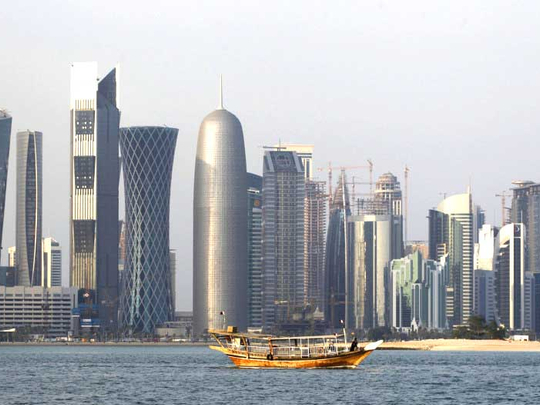
Every GCC member state is anxious to welcome Qatar back into the fold for the sake of the union and because of the cultural and tribal ties which bind. Qatar has a path enabling the country to come out of the cold and, naturally, the Emir Shaikh Tamim Bin Hamad Al Thani is keen to mend fences because his country’s economy is feeling the pinch.
Qatar’s banks are being depleted of liquidity. Investment has stalled along with growth. Ratings agencies S&P and Moody’s have downgraded Qatar’s formerly stellar credit rating. Qatar Airways has had to use creative solutions to maintain its routes. The solution rests with Shaikh Tamim who until US President Donald Trump decided to position himself as peacemaker during the Qatari Emir’s visit to the White House, exhibited nothing other than defiance. Indeed, he poured salt into the wound by accepting Turkish troops on his soil and, worse, cosying up to the Iranian regime, the world’s biggest state sponsor of terrorism out to hold dominion over large swathes of the Arab world.
Throughout Doha’s propaganda outfit Al Jazeera has been broadcasting falsehoods designed to discredit the Saudi-led Quartet while laughably painting the network as a victim of those who wish to silence its ‘honest’ reporting. Trump knows the score. He is well aware of Qatar’s ties with unsavoury terrorist groups and its hosting of criminal Muslim Brotherhood figures. In fact, he struck the match that fired the embers of the quartet’s smoldering resentment against Qatar during his visit to Riyadh. However, the US administration has not been consistent. Its various arms, in particular the State Department and the Pentagon, have sent out messages that do not accord with those of their commander-in-chief.
Anger at deception
Saudi Arabia, the UAE and Bahrain appreciated the American president’s involvement and his positive outlook on ending the rift very soon. It was no coincidence that shortly after a telephone communication between Shaikh Tamim and Trump, the emir called the Saudi Crown Prince Mohammad Bin Salman offering to begin negotiations. Mohammad Bin Salman was receptive. Hope was in the air. But the Saudi stance changed dramatically once Qatar’s News Agency released a fake report giving the impression that the Saudi side went cap-in-hand to initiate contact rather than the other way around. Riyadh, angered by the deception, has accused Qatar of distorting facts and the door is once again shut fast.
Trump might be well-intentioned but rather than wear a mediator’s hat, he should put pressure on Qatar to accept the Quartet’s demands. A mediator should be a neutral figure working to bring parties together when each side has a valid argument. That is not the case here. There is no mediation between a wrongdoer and those who have been wronged.
Saudi Arabia, the UAE, Bahrain and Egypt have been cracking down hard on terrorists for their own security requirements and those of the region. Qatar, on the other hand, has been covertly arming and funding those same groups, and via its Muslim Brotherhood cohorts in Yemen has supported pro-Iranian Al Houthi rebels whose ultimate goal is to infiltrate the Saudi kingdom. Put simply, Qatar needs to change its poisonous foreign policy while being seen to do so. Even if Doha could claim a vestige of the moral high ground, which it cannot, Trump might not be the best interlocutor. Although he is an accomplished wheeler dealer, he lacks diplomacy and has little insight into the area’s protocols and cultural sensitivities.
In reality, the US finds itself caught in the middle between Gulf allies and thus has a vested interest in re-establishing unity. The Pentagon has praised Qatar’s cooperation fearful of losing its military base there — the biggest in the Middle East. Moreover, the ‘America First’ administration is not about to alienate one of its nation’s most prolific investors.
This impasse does not require mediation. All the Qatari emir has to do is agree to the Quartet’s 13 conditions geared towards ending Doha’s funding of terrorist groups, its sheltering of high profile Muslim Brotherhood figures, and its dubious alliance with Iran. Qatar is also being asked to stop interfering in the affairs of its Gulf neighbours and to close down the offensive propagandist outlets it funds. Shaikh Tamim has displayed no intention of conceding to every demand or overhauling his foreign policy in line with the GCC which Qatar says is a red line impinging on its sovereignty. Yet the emir would like the opportunity to sit with Doha’s detractors so he can turn on the charm and make conciliatory commitments just as he did in 2013 and 2014, only to renege upon all. This time the offended states led by Saudi Arabia are in no mood for more Qatari government flimflam; they want set-in-stone assurances and guarantees of good behaviour. If Trump is able to nudge the emir into doing the right thing without leaning on the quartet, he can rightly claim to be the hero of the day.
Linda S. Heard is an award-winning British political columnist and guest television commentator with a focus on the Middle East.










